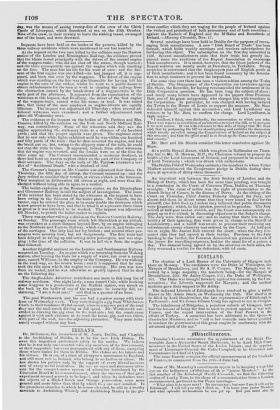At the inquest on the two men killed by the
collision near the Harrow station of the London and Birmingham Railway, the evidence proved that the blame rested principally with the driver of the second engine of the waggon-train ; who did not shut off the steam, though warned ; and the train consequently ran against the engine which was standing an the line. The man lost his life for his want of care : and the fire- man of the first engine was also killed—he had jumped off, it is sup- posed, and been run over by the waggons. The driver of the engine which was standing on the line was also blameable for having left his engine in the care of the stoker, whilst he went to a public-house to obtain refreshments fur the men at work in clearing the railway from the obstruction caused by the break-down of a waggon-train in the early part of the afternoon. It appeared from the examination of the witnesses at this inquest, that Bradbury, the driver of the first engine of the waggon-train, cannot write his name, or read. It was stated also, that many of the men employed as engine-drivers are equally illiterate. The inquest was adjourned till Thursday ; when several ad- ditional witnesses were examined ; and a further adjournment took place till Wednesday next.
The evidence at the inquest on the bodies of Mr. Pattison and Mrs. . Cousins, killed by the collision on the York and North Midland Rail- way, was contradictory. Some of the witnesses said they saw the engine approaching the stationary train at a distance of six hundred yards ; and that the proper signals were given. The engineer stated that he saw only white lights exhibited until he was within one hundred and fifty yards of the train : that he then reversed the engine, and had the break put on, but, owing to the slippery state of the rails, he could not stop the train in time. It appeared, indeed, front other witnesses, that the engine was reversed, and the breaks were on at the time the train came up. The Coroner recommended a moderate deodand, as there bad been no wanton neglect either on the part of the Company or their servants. The Jury on the body of Mr. Pattisses returned a ver- dict of" Accidental Death," with a deodand of .300/.
The Coroner's inquest on Mr. Cousins was adjourned four times. On Thursday, the fifth day of sitting, the Coroner summed up and the Jury retired to consider their verdict, at eleven o'clock in the forenoon. They remained in deliberation till eleven at night, and were then dis- charged without being able to agree to a verdict.
The boiler-explosion at the Bromsgrove station on the Birmingham and Gloucester Railway is still the subject of investigation. The cause of the accident has been stated by the witnesses at the inquest to have been owing to the thinness of the boiler-plate. Dr. Church, the in- ventor, says he ordered the plate to be made double the thickness which it, now proves to have been, and that be tried it at a pressure-three times as great as it was intended to be worked. The inquest was adjourned till Monday, to permit the boiler-maker to explain.
There was another railway-collision on the Eastern Counties Railway, ea Sunday. The passenger-train which left Shoreditch at ten o'clock, was overtaken at a short distance beyond Bow, by an engine belonging to the Northern and Eastern Railway, which ran into it, and broke two of the carriages. One lady had her leg broken ; and several other pas- sengers were severely hurt, but not dangerously. The first train had been delayed in taking up and setting down passengers, and was stop- ping ;.t the time of the collision. It was in full view from the engine that followed.
Another frightful accident on the London and Southampton Railway occurred on Tuesday. An engine which was returning from the Woking station, after leaving the train for a supply of water, ran over a young man, named Williams, in the employ of the Company. He was walking in the road-way, on his return home; and it is supposed that he mis- took the side upon which the engine was coming. His arm was torn from its socket, and he was otherwise so greatly injured that be died on the following day.
The SlObrdshire Ad' ertiser contributes one more to this long list of railway accidents. One night lately, a man named Cain, while hooking some waggons to a goods-train at the Stafford station, was struck on the hack by the buffer of one of the waggons: he instantly fell, ex- claiming, " I am a dead man!" and died in a quarter of an hour.


























 Previous page
Previous page